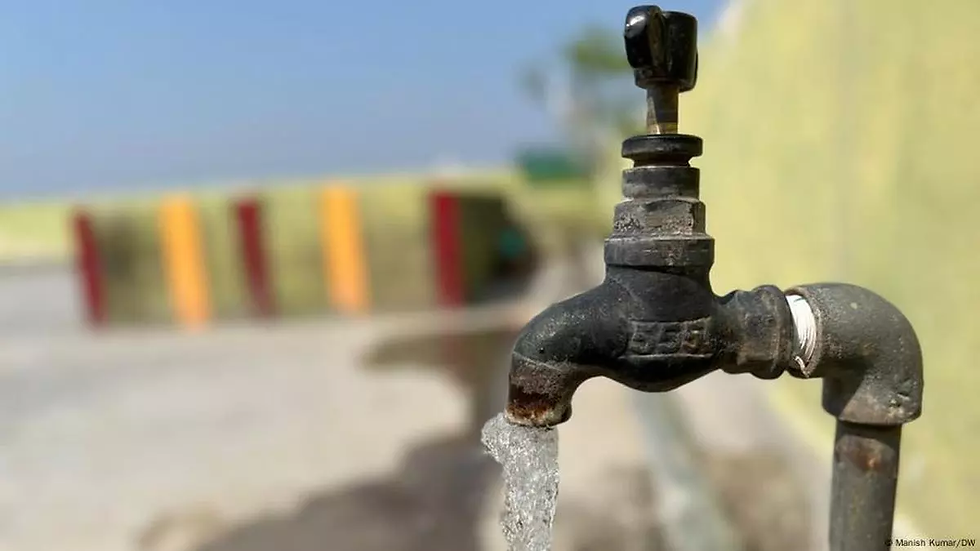World Water Day (22 March, 2025): Preserving Glaciers, Protecting Water Security
- Change in Range

- Mar 22
- 4 min read
“Glaciers may be shrinking, but we cannot shrink from our responsibilities (...) Action this year is critical. Every country must deliver strong national climate action plans aligned with limiting global temperature rise to 1.5 degrees Celsius." -António Guterres (UN Secretary-General)
Can you imagine a world where rivers dry up, water sources become scarce, and once-mighty glaciers turn into mere memories. This is not a scene from a dystopian novel—it is a reality unfolding before our eyes. Water, the essence of life, is under threat, and the crisis is accelerating faster than we ever imagined. With rapid rate of global warming, our frozen world is shrinking rapidly. But it's not just the heat—air pollution is also triggering glacier loss. Black carbon (soot) from burning fossil fuels and biomass settles on ice, darkening the surface and making glaciers absorb more heat. As a result, glaciers melt faster than ever before, threatening freshwater supplies for millions. If this continues, the world’s largest natural reservoirs may disappear within a few decades, triggering a severe water crisis for future generations.
Theme of World Water Day 2025
Since 1993 onwards every year on March 22, the world celebrates World Water Day, an initiative by the United Nations (UN) to raise awareness of global freshwater challenges and solutions. The theme for World Water Day 2025 is "Glacier Preservation”. It brings our attention to another critical crisis—the rapid melting of glaciers, the natural reservoirs of fresh water.
Why Does World Water Day Matter?
The global water crisis is a stark reality, with statistics painting a horrifying picture of freshwater accessibility and security.
According to United Nations International Children's Emergency Fund (UNICEF)-
Water is a fundamental human right, yet four billion people — almost two thirds of the world’s population — experience severe water scarcity for at least one month each year.
Over two billion people live in countries where water supply is inadequate.
Half of the world’s population could be living in areas facing water scarcity by as early as 2025.
Nearly 700 million people could be displaced by intense water scarcity by 2030.
By 2040, roughly 1 in 4 children worldwide will be living in areas of extremely high-water stress.
The World Economic Forum's Global Risks Report 2025 ranks natural resource shortages, including water insecurity, as the 4th biggest risk over the next decade. With freshwater demand increasing due to population growth, urbanization, and climate change, urgent interventions are necessary to protect our most precious resource.
Glaciers: The Silent Guardians of Freshwater
Glaciers store approximately 70% of the Earth's freshwater and play a vital role in maintaining the global water cycle. They act as natural regulators, slowly release meltwater, ensuring year-round supply for drinking water, irrigation, and energy production. Major river systems, including the Ganges, Indus, and Yangtze, depend on glaciers for their flow, supporting millions of people across Asia, South America, and Europe.
However, these frozen reservoirs are disappearing at an alarming rate. Over the past two decades, terrestrial water storage, including snow, ice, and soil moisture, has declined at a rate of 1 cm per year, severely impacting water security. The accelerated melting not only disrupts freshwater availability but also leads to rising sea levels, threatening coastal communities and biodiversity. Without urgent intervention, the consequences of glacier loss will be irreversible and devastating.
Global Efforts to Address the Water Crisis
Recognizing the urgent need for action, the United Nations has designated 2025 as the International Year of Glacier Preservation. This initiative aims to:
Raise awareness about the importance of glaciers and their role in water security.
Encourage scientific research to better understand the impacts of glacier loss.
Promote climate action to reduce global warming and slow glacial retreat.
Support sustainable water management practices at both local and global levels.
Governments, environmental organizations, and scientists are working together to develop strategies such as glacier monitoring systems, improved water conservation policies, and climate adaptation programs. Technological solutions like rainwater harvesting, desalination, and wastewater recycling are also being explored to mitigate the effects of water shortages.
What Can We Do? Individual and Collective Action
“When the well is dry, we know the worth of water.” — Benjamin Franklin.
While large-scale policies and international agreements are significant, individual actions also matters in water conservation. Simple yet effective steps include:
Reducing water waste by fixing leaks, using water-efficient appliances, and limiting excessive water usage.
Supporting climate action by reducing carbon footprints, promoting renewable energy, and advocating for stronger environmental policies.
Participating in community initiatives such as tree planting, watershed restoration, and awareness campaigns.
Educating others about the importance of glacier preservation and sustainable water management.
Way forward: A Collective Responsibility for Our Water-Secure Future
World Water Day 2025 is not just a day of awareness—it is a call for immediate action. Protecting glaciers is not only an environmental concern but also a humanitarian necessity. If we fail to act now, it will be too late to revert. Public and private sector, community and individuals must work together to implement policies and practices that ensure water security for all. As we observe World Water Day, let us remember that every drop counts—and so does every action.
Reference:
Susama Khan
B.A. (H) Geography
2nd year








Comments